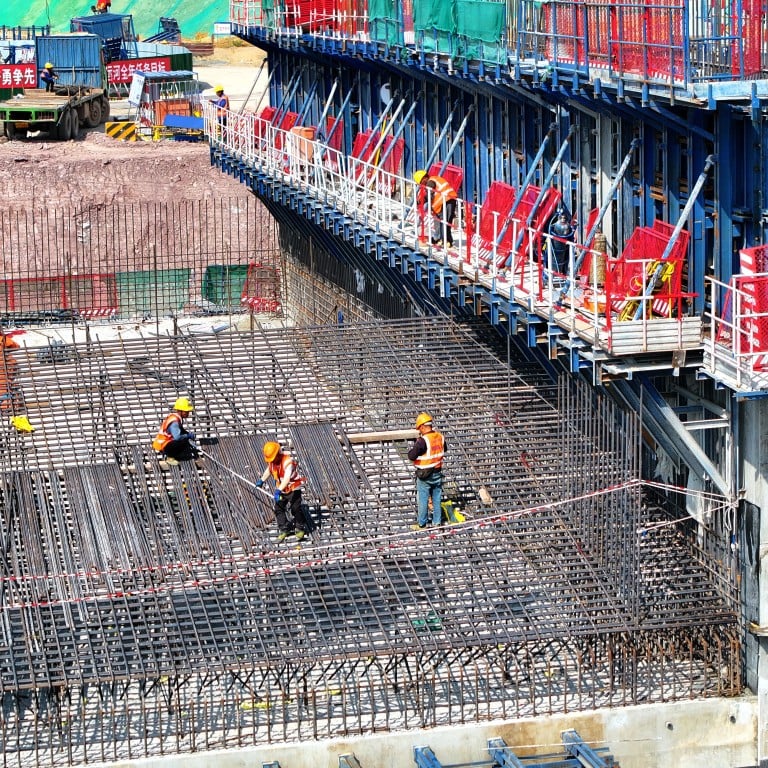
An exodus of foreign capital from China – a prime concern for policymakers in an era of diminished growth – has entered a “slowed” and “stable” stage as an improved economic outlook has raised hopes some foreign investors may return, government advisers said on Wednesday.
Comments from subject matter specialists indicate growing domestic confidence in the results of a countrywide charm offensive to entice investors back.
Jiang Xiaojuan, former deputy secretary general of the State Council, said while short-term geopolitical and supply chain changes have caused foreign businesses to leave China, the trend will slow.
Many multinational companies do not have an alternative market, and those markets also have their own problems
Zhang Ming, Chinese Academy of Social Sciences
“It appears to have stabilised,” she said at an annual conference hosted by financial magazine Caijing.
Jiang said while foreign companies that left are not repatriating moved factories and assets, since March some have apparently decided to keep sourcing goods from China, or have returned to previous Chinese suppliers after moving orders out.
She added the volatility of the global economy and the difficulties of operation for companies who moved to Southeast Asia have made companies more aware of the competitiveness of Chinese manufacturers.
“If these companies are really resistant to working with China, they would not make such decisions,” said Jiang, who is now president of the China Society of Industrial Economics, an academic organisation under the Chinese Academy of Social Sciences (CASS). “We must see China has grown to compete with other middle to high-end manufacturing powers in the world, and everything we are experiencing now is a normal state of market competition.”
Jiang’s optimism, however, has yet to be reflected in Chinese economic data. The numbers show both foreign direct investment and exports have continued to slump despite encouraging signs in the third quarter.
Capital outflow pressures have been mounting as a slowing global economy and US-China rivalry fuels investor worries. The country reported its first-ever quarterly deficit in foreign direct investment (FDI) since the data started being recorded in 1998. A focus on national security and revamped anti-espionage legislation have also fuelled doubts about the investment environment, compounding the problem further.
Exports also continue to drop as Western governments call for a “de-risking” of supply chains from a perceived overreliance on China. Customs figures showed a fall of 6.4 per cent in October from the year before, a greater plunge than the already steep 6.2 per cent decline observed in September.
Beijing has attempted to find a silver lining, highlighting the fact China remains a magnet for global investors with all-time high FDI flows of 1 trillion yuan (US$137.3 billion) in the first nine months of the year.
Zhang Ming, deputy director of CASS’ Institute of Finance and Banking, also spoke at the forum in Beijing and echoed Jiang’s view that the current trend of “short-term foreign investment” outflows could change next year.
“Many multinational companies do not have an alternative market, and those markets also have their own problems,” Zhang said. “China’s economy is showing signs of rebound and we are trying to improve our investment environment, so there could be improvement in FDI next year.”
Wang Tao, head of Asia economics and chief China economist of UBS Investment Bank, said at the Wednesday forum the decline of FDI was caused by factors such as supply chain relocation and rising interest rates in the US, but these did not significantly diminish the country’s growth potential.
“On the one hand, we should respond to structural adjustments and continue to promote reform and opening up,” she said. “On the other hand, we should stabilise China’s economy in the short term, and make sure it can achieve sustainable medium-speed growth in the long term.”
A vast market with fast growth is still attractive to investors and companies
Wang Tao, UBS
In perhaps the highest-profile comment on the state of investor sentiment, US commerce secretary Gina Raimondo said during her summer visit to the country there has been speculation over whether China has become “uninvestable”.
An annual survey by the US-China Business Council showed that American corporations in China were in “wait-and-see mode”, not planning to make any changes over the next 12 months.
Experts at the forum, however, were undeterred.
“In the long run, China’s annual growth will still be above 4 per cent in the next 10 years, so China will still be the economy that contributes the most to global economic growth and will continue to be the second-largest economy,” Wang of UBS said. “A vast market with fast growth is still attractive to investors and companies.”
News Related